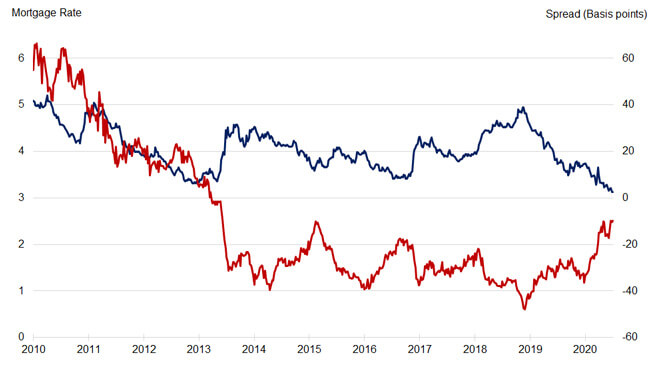The Influence of Jumbo Lendings on Your Funding Alternatives: What You Required to Know Before Applying
Jumbo finances can play a pivotal role in shaping your financing choices, specifically when it involves getting high-value buildings. While they supply the possibility for larger funding amounts without the worry of private mortgage insurance (PMI), they likewise include rigid certification standards that call for mindful factor to consider. Recognizing the equilibrium in between the advantages and difficulties postured by these lendings is vital for potential customers. As you evaluate your choices, the ramifications of passion prices and product accessibility may trigger you to reassess your monetary approach relocating ahead (jumbo loan).
Understanding Jumbo Financings
Comprehending Jumbo Loans requires a clear understanding of their distinct characteristics and needs. Jumbo loans are a kind of home loan that exceeds the adapting funding limits developed by the Federal Housing Money Company (FHFA) These restrictions differ by location yet usually cap at $647,200 in most locations, making jumbo loans necessary for financing higher-priced homes.
One of the specifying attributes of jumbo financings is that they are not eligible for acquisition by Fannie Mae or Freddie Mac, which leads to stricter underwriting standards. Borrowers need to often demonstrate a greater credit score, generally over 700, and provide considerable documents of earnings and assets. Furthermore, lenders may need a larger down payment-- typically 20% or more-- to reduce threat.
Interest rates on big lendings can be somewhat more than those for adhering lendings due to the raised threat assumed by the lending institution. The absence of private home loan insurance coverage (PMI) can balance out some of these prices. Understanding these elements is crucial for potential borrowers, as they considerably influence the terms and expediency of protecting a jumbo financing in today's affordable realty market.
Advantages of Jumbo Lendings
Jumbo finances supply distinctive benefits for buyers looking for to purchase high-value residential or commercial properties that exceed standard loan limits. One of the main benefits of jumbo financings is their capacity to fund larger amounts, enabling purchasers to get homes in premium markets without the constraints enforced by conforming car loan limitations - jumbo loan. This versatility allows property buyers to view a more comprehensive variety of properties that might better match their choices and needs
In addition, jumbo lendings often feature competitive rate of interest, specifically for customers with solid credit scores accounts. This can result in significant cost savings over the life of the car loan, making homeownership more economical in the future. Additionally, big finances can be tailored to fit specific financial circumstances, supplying various terms and amortization choices that align with the customer's purposes.

Challenges of Jumbo Loans
Browsing the complexities of jumbo financings provides several obstacles that prospective borrowers need to be conscious of before continuing. One substantial obstacle is the stringent loaning requirements enforced by monetary organizations. Unlike conforming financings, big car loans are not backed by government-sponsored ventures, leading loan providers to adopt even more rigorous criteria. This commonly includes click here to find out more greater credit report requirements and considerable documentation to validate earnings and properties (jumbo loan).
In addition, jumbo car loans commonly come with higher rate of interest contrasted to standard loans. This elevated expense can dramatically influence monthly payments and overall cost, making it necessary for consumers to carefully evaluate their monetary scenario. In addition, the down payment requirements for jumbo car loans can be considerable, commonly varying from 10% to 20% or more, which can be an obstacle for several possible home owners.
One more obstacle exists in the limited accessibility of big car loan items, as not all lending institutions provide them. This can cause a lowered pool of choices, making it vital for borrowers to conduct complete study and potentially seek specialized loan providers. Generally, recognizing these challenges is vital for anybody taking into consideration a big lending, as it guarantees educated decision-making and far better economic planning.
Qualification Requirements
For those taking into consideration a big car loan, fulfilling the credentials criteria is an essential action in the application process. Unlike traditional finances, big finances are not backed by federal government firms, leading to stricter demands.
To start with, a solid credit history score is crucial; most loan providers require a minimal score of 700. In addition, debtors are typically anticipated to demonstrate a significant earnings to guarantee they can easily manage greater monthly settlements.
Deposit needs for big car loans are also considerable. Customers should prepare for taking down at least 20% of the building's purchase cost, although some loan providers may use choices as low as 10%. Demonstrating cash money gets is crucial; loan providers often need proof of enough fluid properties to i thought about this cover several months' worth of home loan repayments.
Contrasting Funding Alternatives
When examining funding alternatives for high-value buildings, comprehending the distinctions in between various finance types is vital. Big lendings, which go beyond conforming funding restrictions, generally featured stricter certifications and higher rates of interest than conventional financings. These loans are not backed by government-sponsored business, which increases the loan provider's threat and can bring about a lot more strict underwriting criteria.
On the other hand, standard financings use more adaptability and are frequently easier to get for consumers with strong credit score accounts. They may feature lower rate of interest and a bigger array of choices, such as dealt with or variable-rate mortgages. In addition, government-backed loans, like FHA or VA finances, offer possibilities for reduced deposits and more lenient credit history demands, though they also enforce limitations on the lending amounts.

Verdict
To conclude, jumbo car loans present both possibilities and difficulties for potential buyers seeking financing for high-value residential or commercial properties. While these fundings permit bigger amounts without the worry of personal home loan insurance coverage, they feature rigorous qualification demands and prospective drawbacks such as greater rate of interest prices. An extensive understanding of the benefits and challenges related to big car loans is vital for making informed choices that align with lasting economic objectives and purposes in the realty market.
